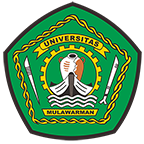ESG: Criteria 2.7

2.7 - Information Management
Unmul has developed a robust information management system that underpins both academic and administrative operations. This system is designed to systematically collect, analyze, and utilize data from students, lecturers, staff, and alumni. The comprehensive data enable the university to monitor academic progress, evaluate teaching quality, and continuously improve learning and service delivery.
(1) Entry Survey for New Students
At the start of every academic year, new students complete an Entry Survey during orientation. This survey gathers essential background data—such as place of origin, economic status, and prior schooling—which are then used to tailor inclusive learning methods (Appendix 7.1A – Entry Survey Form and Summary).
(2) Teaching Quality Evaluation
Unmul conducts semesterly evaluations through both offline and online questionnaires that gather student feedback on lecturers’ teaching methods, course materials, and technology usage. These evaluations are analyzed by the Quality Assurance Unit (UPM) to identify strengths and areas for improvement (Appendix 7.1B – Teaching Evaluation Reports and Questionnaire Samples).
(3) Academic Information System (AIS)
The AIS tracks students’ academic progress, including cumulative GPA, study history, and enrolment status. It also facilitates access to academic advisors and integrates tuition payment processes with banking partners, ensuring seamless financial transactions (Appendix 7.1C – AIS System Overview and Integration Records).
(4) Learning Evaluation System (SEP)
Coordinated by LPMPP in collaboration with PT. PERKASA, SEP allows continuous feedback on learning experiences and lecturer performance. This system supports academic quality improvements by consolidating student evaluations for review by faculty management (Appendix 7.1D – SEP System User Guide and Feedback Summaries).
(5) Career Development and Alumni Tracking
The Career Development Centre (CDC) bridges the gap between academic programs and the job market by tracking alumni outcomes. Regular stakeholder satisfaction surveys—including feedback from employers—assess graduates’ skills in professionalism, teamwork, and foreign language proficiency (Appendix 7.1E – CDC Survey Results and Employer Feedback Reports).
(6) Attendance and Community Engagement Systems
A Lecturer and Student Attendance System records attendance and ensures that lecture content aligns with the Semester Learning Plan (RPS). Additionally, an online location-tracking system is used during the Community Service Program (KKN) to document and monitor student activities in real time (Appendix 7.1F – Attendance and Location-Tracking System Overview).
(7) Human Resource Management via SISTER
For academic staff, Unmul employs the Integrated Resource Information System (SISTER) to maintain detailed lecturer portfolios, support career development, and manage certification and credit point assessments (Appendix 7.1G – SISTER System Documentation).
1. Assessment
While Unmul’s information management framework effectively supports academic processes and continuous improvement, the following areas have been identified for further enhancement:
(1) Data Privacy Policy
Despite extensive data collection, a comprehensive Data Privacy Policy is not yet fully formalized. This policy should clearly outline procedures for data storage, usage, and tracking of personal information to comply with international privacy standards (Appendix 7.2A – Draft Data Privacy Policy).
(2) Standardization of Data Collection
Currently, there is variation in data collection methods across different study programs. Standardizing these processes is critical to ensure consistent evaluation and comparability of performance indicators (Appendix 7.2B – Data Collection Guidelines).
(3) Academic Freedom
There is a need to balance robust monitoring of teaching quality with the respect for academic freedom. Guidelines should be developed to allow lecturers the discretion to select topics and methodologies while maintaining high standards of teaching (Appendix 7.2C – Academic Freedom Policy Draft).
(4) Language in Data Management
To support Unmul’s internationalization efforts, key academic and administrative systems should increasingly adopt English alongside Bahasa Indonesia. A phased Language Transition Plan is recommended to make data more accessible for international stakeholders (Appendix 7.2D – Language Transition Plan).
